- Home
- Christina Lauren
The House
The House Read online
* * *
Thank you for downloading this eBook.
Find out about free book giveaways, exclusive content, and amazing sweepstakes! Plus get updates on your favorite books, authors, and more when you join the Simon & Schuster Teen mailing list.
CLICK HERE TO LEARN MORE
or visit us online to sign up at
eBookNews.SimonandSchuster.com/teen
* * *
For Erin, who loves the scary and the swoon
ACKNOWLEDGMENTS
We’ve written fifteen books together. FIFTEEN. Of these books, thirteen are adult romance; one is still up in the air, and though Young Adult was our first love, this book you’re holding right now—The House—is only our second book for teens. It’s been a story in our hearts for nearly four years now, and we hope it’s found a home in yours as well.
Publishing is a strange and mysterious world where creativity meets practicality; books need to be categorized and labeled and shelved correctly (for what it’s worth, if there’s a Kissing Books shelf, we’d like to be put on that, please). We are endlessly lucky to be surrounded by people who encourage us to write the stories in our heads, whatever they may be.
First on that list is the ninja agent. But Holly Root isn’t just an agent; she’s a magician, a sage, a closet piglet, and a champion. Thank you for a thousand things, Holly, but most frequently for agreeing that another kissing scene is always a good idea, and for showing us that it’s possible to juggle all the things and still kick ass at every single one of them.
Thank you to our amazing editor, Zareen Jaffery. Romance + monster houses = a rare combination. It was a blast to be able to tackle this, and your editorial touch brought it to life.
Simon & Schuster is the perfect home for us, and everyone there deserves a corner office, two recesses a day, and thirty-seven high fives. Thanks to Justin Chanda, Katy Hershberger, Chrissy Noh, Julia Maguire, and Mekisha Telfer. A world of love to Lizzy Bromley for giving us the most beautiful covers.
Erin Billings Service, thank you for your honesty, for reading every word we write, and for your enthusiasm when you have to read those same words over and over and over again. Thank you for also not blocking our e-mail. *heartkite*
Thanks to Lauren Suero for being the most awesome—and best dressed—assistant ever. Heather Carrier, we would be nothing but badly drawn stick figures and Comic Sans without you. Don’t ever leave us.
To have writers you adore and respect read your words and love them means the world to us, so thank you to Ransom Riggs and Alexandra Bracken—Ransom is spoken for (and we adore his wife), but we’re definitely going to marry Alex someday. It’s a total deal; instead of one ring you get two. That’s just math, Alex. Ransom, you get cake. And hugs. And typos in our e-mails because you left us with the giddy shakes.
We couldn’t write acknowledgments to any YA book without thanking Nathan Bransford and Tahereh Mafi. Along the way you’ve both given us advice, support, and encouragement when we needed it. You’re real, and positive, and wise—we owe so much of what we have to what you’ve been willing to share.
Our families put up with a lot of mumbling-in-slippers, crazy travel schedules, overflowing bookshelves, and oh-right-it’s-dinner-times. Thank you for loving us anyway. We’ll try to do better for the next few books, but it’s probably best to not hold your breath.
We still remember when we would have sold our souls to write books for a living, and so we’ve saved the most important for last: Thank you to our readers. Writing these stories for you is a dream. Thank you for your trust and your endless enthusiasm, and for following us when we wanted to stretch our legs and do something a little different. We hope we make you proud.
Lo, I hope we’re still ridiculous and screaming from the front row of concerts we’re too old for even when we’re eighty. Thank you for being my left quote.
C, I love you so much I’d sell my soul in any direction for you.
Chapter One
Her
Places with boys always seem so dirty.
As soon as Delilah had the thought, she hated herself for it because it was exactly what her mother would think. Girls were just as dirty after all, with thick, sticky makeup and every flavor of perfume clouding the locker rooms. The public high school seemed to have a dim film layered over the lockers and floor, walls and windows. It was the first day back after the winter, so Delilah assumed that everything had been cleaned vigorously over the break, but maybe the fog of girl and boy hormones mixing together had permanently dulled every surface.
All around, students pressed past her and lockers slammed near her head, and she struggled to appear unaffected by the public-school chaos. Delilah looked down to the piece of paper clutched in her hand. Before she’d even been dressed and fed this morning, her mother had already begun highlighting all of the important information for her: locker number, locker combination, class schedule, teacher names.
“I should have printed a map for you,” Belinda Blue had said as the highlighter squeaked across the page. Delilah had looked away to the neat rows on the carpet left by the vacuum cleaner, had waved politely to her father as he’d walked into the kitchen wearing his standard outfit of tan pants, a short-sleeved white collar shirt, and a red tie. Even though he wasn’t going to work and maybe didn’t even have a job interview today, she couldn’t fault him for dressing the part. She, too, was still more comfortable in clothes that resembled her private-school uniform than she was with having this new freedom to wear whatever she wanted.
“Mom, it’s only two main buildings. I can handle it. Saint Ben’s had seven.”
Morton City High was smaller than Saint Benedict’s Academy in pretty much every way possible, from the size of the classrooms and number of buildings, to the minds of the student body. Whereas—perhaps unexpectedly—imagination had been embraced and nurtured in her beautiful Catholic school, there had always been a single way of thinking in her small Kansas hometown, a tendency to embrace normal and disregard anything else in hopes that it might simply go away.
It was what had happened to Delilah six years ago, after all. Her parents had tolerated her strangeness with shared looks of exasperation and long-suffering sighs, but then had shipped her off to Massachusetts as soon as an excuse presented itself.
“Still, you’re used to calm. This school is so big and loud.”
Delilah smiled. When her mother said “loud” she really meant “full of boys.” “I’m pretty sure I’ll make it out alive.”
Her mother had given her the look Delilah had seen countless times over winter break—the look that said, I’m sorry you can’t finish your senior year in a fancy school. Please don’t tell anyone your father lost his job and your nonna’s money is all tied up in her nursing care.
The look also said, Be careful of the boys. They have thoughts.
Delilah had thoughts too. She had a lot of them, about boys and their arms and smiles and how their throats looked when they swallowed. She had infrequent contact with these things, having been sequestered away for the past several years at an all-girls boarding school, but she certainly had thoughts about them. Unfortunately, the schedule in her hand didn’t mention a thing about boys, and instead read: English, Phys Ed, Biology, Organic Chemistry, World Studies, AP French, AP Calculus.
She felt her enthusiasm wilt a little before the day had even started. Who wants to have PE so early in the day? She’d be a sweaty mop and would never factor into any thoughts anyway.
Delilah successfully negotiated her locker combination, stowed some books, and headed to English. The only empty seat in the room—Room 104, Mr. Harrington, highlighted in yellow, thank you, Mother—was of course in the middle, up front. Delilah was a bull’s-eye for the teacher and for the fellow st
udents. But even if she sat in the back of the room, it wouldn’t have made a difference: She was a target anyway.
Delilah Blue was back from the fancy East Coast boarding school.
Delilah Blue had come home to go slumming.
Although she spent some of each summer back in Morton, being at school here was different. Delilah had forgotten how many teenagers could come out of the woodwork, and all around her they were yelling, throwing notes, whispering across aisles. Was this how they always behaved while waiting for the teacher? When your time is yours, use it to create something, Father John had always told them. A picture, some words, anything. Don’t rot your brain with gossip.
Having seen only her best friend, Dhaval, with any sort of regularity—and maybe a handful of her classmates around town during breaks—Delilah’s memories were an old stack of pictures of her eleven-year-old peers. She struggled to place the faces she remembered from six years ago with the reality of the faces now.
Rebecca Lewis, her best friend from kindergarten. Kelsey Stiles, her archnemesis in third grade. Both were looking at Delilah as if she’d kicked a puppy before class. Rebecca probably glared at her because Delilah had left Morton so successfully. Kelsey probably glared at Delilah for having the gall to come back.
Not everyone had been hostile when they recognized Delilah; some girls had greeted her in front of the school with hugs and high-pitched welcomes, and Delilah knew that she had a completely blank slate there. She could be anyone she wanted to be. She didn’t have to be the girl whose nervous parents sent her away when she was only eleven for getting into a fistfight defending her unrequited first crush.
Delilah took her seat next to Tanner Jones, the only person to ever have beaten her at tetherball in sixth grade, her last year of public school.
“Hi, Delilah,” he said, eyes on her legs and then chest and then mouth. Six years ago he’d been looking at her pigtails and skinned knees.
She smiled to hide her surprise. Delilah hadn’t expected the first boy to speak to her to also have thoughts. “Hi, Tanner.”
“I heard you had to move back because your dad lost his job at the plant.”
She kept her smile and stayed quiet, thinking of her mother’s innocent-at-best, naive-at-worst hope that people would assume Delilah came home for a single semester for educational purposes, and not because Nonna’s well of money had dried up. Clearly the town knew better.
Your business is only yours until you share it, Father John had always told them.
Just as Mr. Harrington was closing the classroom door, a boy slipped in, mumbling an apology and staring with determination at the floor.
Delilah’s breath grew trapped in her throat, and the old protective fire flickered to life between her ribs.
He was the same, but not. His shirt was black, jeans were black, and shaggy black hair fell into his eyes. He was so tall he must have been pulled like taffy. When he looked up at Delilah as he passed, the same eyes she remembered from all those years ago—dark and stormy and shadowed with bluish circles—seemed to flicker to life for a moment.
Just long enough for her to lose her breath.
He looked like he knew every one of her secrets. Who would have guessed that after six years Gavin Timothy would still seem so perfectly dangerous?
Apparently, Delilah was still smitten.
Chapter Two
Him
It wasn’t unheard of for girls to watch him, but usually it meant one of two things. Either they were terrified that Gavin might pull a knife from his shoe (which had never happened), or they were building up the courage to ask him out, with hopes of bringing him home to terrify their parents into buying them a car (which had happened twice).
Delilah Blue was back in Morton and was watching Gavin in a singularly different way. She looked like a wolf stalking a rabbit.
He spun a pencil on his notebook and blinked up, looking right into her eyes and causing her to whip around in her seat, sitting ramrod straight. Her caramel hair was braided and secured tightly with a red elastic band, swinging into position at the middle of her back just below her shoulder blades. Her foot tapped impatiently under her desk. For the remainder of class, she was obviously attentive, maybe overly so. But what she was attending to was definitely not at the front of the room. If she were a cat, she would have her ears turned back, facing him. Gavin was sure of it.
He could still remember the way she’d looked the last time he’d seen her: scraped knuckles, bloody nose, and an expression of protectiveness so feral it made his stomach twist. He’d never even had a chance to say thank you.
The end-of-period bell rang, and Delilah jumped, looking frantically for the source. Did they not have bells at her fancy private school? Because yes, Gavin knew enough about Delilah to know exactly where she’d been. But why she was back was an entirely different question.
Just as she appeared to spot the bell, perched above the whiteboard, the door flew open and Dhaval Reddy swept into the room, pulling her up and wrapping his arms around her.
“My girl is back!” Dhaval sang loudly to no one in particular. As everyone gathered their things, Gavin felt the room settle: Delilah’s return had been approved by the in crowd.
Gavin collected his books and papers and slipped past her, but not before he felt her hand reach out and touch his, or before he saw the tiny drawing on her notebook: a dagger dripping blood.
Chapter Three
Her
Heeding Father John’s advice, Delilah always understood that the best way to keep a secret was simply to not tell anyone. And over the years, she had accumulated hundreds of secrets. Like the time Nonna took her to Saks in Manhattan and Delilah walked in on two people having sex in the bathroom. Or the time she snuck Joshua Barker into her dorm room and kissed him for ten minutes before making him slink back out across the dark, dewy lawn.
Those were secrets she planned to eventually share as currency, in the girlfriend version of “I’ll show you mine if you show me yours.” But there were other secrets too—ones she might never share because she knew they made her weird. Secrets like her strange appreciation of gore: depictions of fifteenth-century torture devices, paintings of people dying at the hand of swords or arrows. The idea of reanimation, zombies, exorcism. Books on the Black Plague. It wasn’t that she particularly treasured the idea of dying, or of other people dying; it was the visceral reaction to the creepy, the spectacularly scary, the otherworldliness of horror. Delilah loved the catch of breath when she was afraid, the feel of goose bumps dancing up her arms.
Back at Saint Ben’s, she used to wander the cold stone hallways of the Fine Arts Building at night, barefoot, without a flashlight. With every light extinguished, the halls would be pitch-black, stones heavy and silent. Not even a draft could slip in and ruffle the heavy drapes or rattle a painting on the wall.
Delilah knew every turn by heart. Everything was perfectly still, empty but for the girl slipping between shadows, looking for a sign that things happened in the school after dark. Searching for some long-forgotten history that would come alive only when the students were all safely tucked in their beds.
She’d been caught once, two weeks before she was jerked back home for good. Father John had found her tiptoeing down the hall between Sister Judith’s ceramics classroom and the auditorium. In that small stretch was an old jeweled chest from the eighteenth century, an elaborate work of art and wealth that simply sat, so trusting, in the middle of an ordinary hallway. The chest was big enough to hold a small child or, Delilah preferred, a very patient hellhound.
“Hunting for ghosts?” Father John had asked from behind her, making Delilah jump.
Once her heartbeat slowed, she admitted, “Yes, sir.”
She’d expected a lecture, maybe one of his bits of wisdom. But instead he’d smiled knowingly at her, nodded, and said simply, “Back to your room, then.”
Her parents had no idea of these fascinations; Delilah had worked hard to keep this side
hidden. It hadn’t been that hard, living more than a thousand miles away for the past six years, and also given who her parents were: Her mother had cardigans in every shade of pastel and had worn the same brand of sensible penny loafers for as long as Delilah could remember. Her mother’s books all had bare, muscled chests on the covers, and her hobby was collecting tiny ceramic animals, which were a form of creepy that Delilah had never really appreciated.
Her father, before he lost his job, had been a workaholic, and when he was home he was generally planted in front of the television, where he would be grousing about something or another. To Delilah, he was an inanimate object in a dad suit: Since she’d been home, Delilah had the sense that she wouldn’t have known her father better even if she’d lived at home these past six years.
Though Delilah had longed for a sibling, none had ever appeared, and she’d had to settle for her partner-in-single-childom, Dhaval Reddy, whose parents were as obsessive and attentive as her own were disinterested. But while Dhaval’s rebellion would turn out to be his loud and exuberant manner in a gently spiritual household, Delilah’s quirky obsession would always remain silent: She had hundreds and hundreds of drawings of severed heads, fists curled cruelly around still-beating hearts, and dark, endless tunnels squirreled away beneath the loose floorboard in her closet.
It was the same dark fascination that drew her to Gavin Timothy.
Dhaval was with her when the obsession started. They were nine and had been at the theater watching Wallace and Gromit: The Curse of the Were-Rabbit. Delilah had insisted they sneak into Corpse Bride after and had made him sit through two consecutive shows. Her life in the tiny square mile of Morton felt small and easy, oppressively ordinary. The idea that another world like this could exist—one that wasn’t beige or boring or safe—was like a siren song.
The next day at school was the first time Delilah really noticed Gavin. He was tall and hunched, with hair so dark and shaggy it would have covered his entire face if Miss Claremont hadn’t made him at least tuck it behind his ears. His eyes even then were ringed with darkness below and long black lashes above. He had no blush to his cheeks, but bloodred lips and arms so long and skinny they seemed to be made from string.

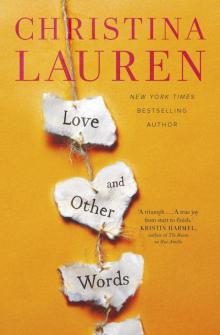 Love and Other Words
Love and Other Words Autoboyography
Autoboyography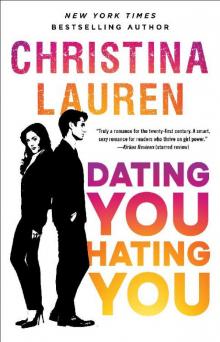 Dating You / Hating You
Dating You / Hating You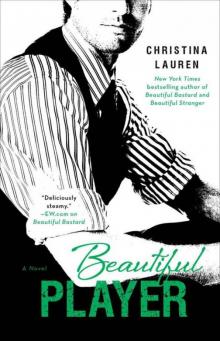 Beautiful Player
Beautiful Player Beautiful Bombshell
Beautiful Bombshell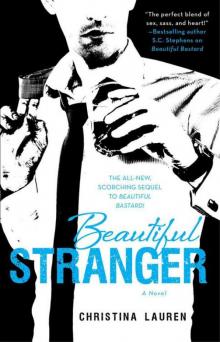 Beautiful Stranger
Beautiful Stranger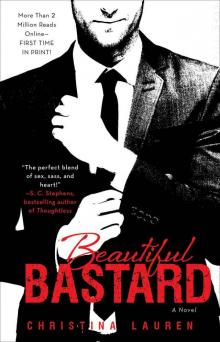 Beautiful Bastard
Beautiful Bastard Beautiful Secret
Beautiful Secret The Unhoneymooners
The Unhoneymooners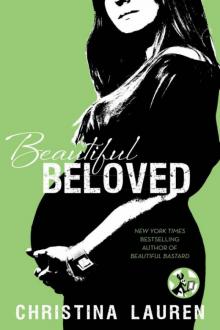 Beautiful Beloved
Beautiful Beloved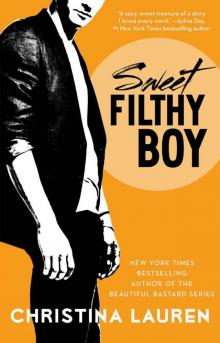 Sweet Filthy Boy
Sweet Filthy Boy Dark Wild Night
Dark Wild Night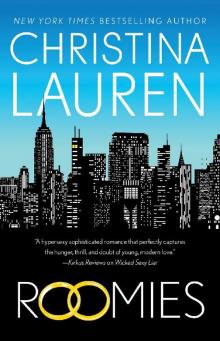 Roomies
Roomies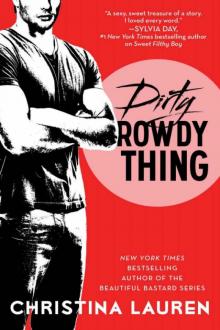 Dirty Rowdy Thing
Dirty Rowdy Thing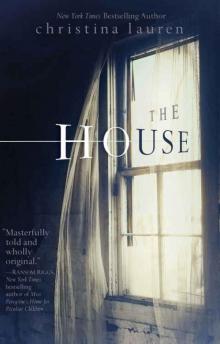 The House
The House Beautiful Bitch
Beautiful Bitch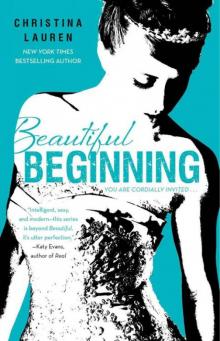 Beautiful Beginning
Beautiful Beginning Josh and Hazel's Guide to Not Dating
Josh and Hazel's Guide to Not Dating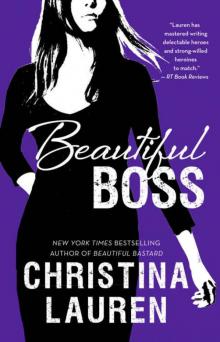 Beautiful Boss
Beautiful Boss In a Holidaze
In a Holidaze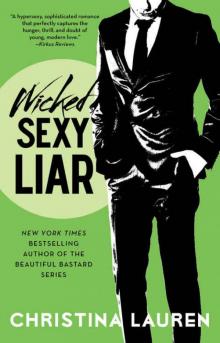 Wicked Sexy Liar
Wicked Sexy Liar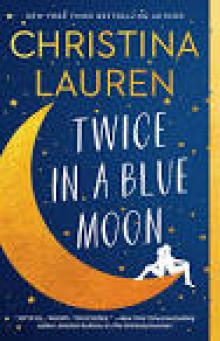 Twice in a Blue Moon
Twice in a Blue Moon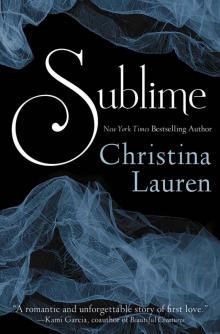 Sublime
Sublime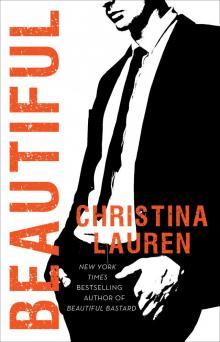 Beautiful
Beautiful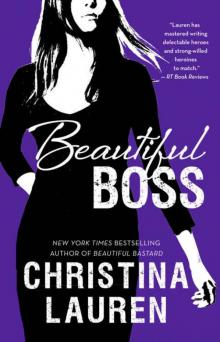 Beautiful Boss (Beautiful #9)
Beautiful Boss (Beautiful #9)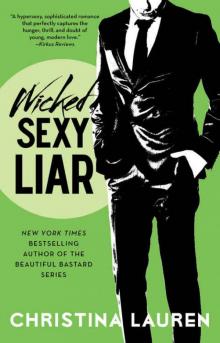 Wicked Sexy Liar (Wild Seasons #4)
Wicked Sexy Liar (Wild Seasons #4)